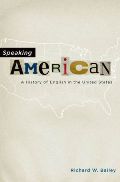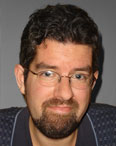Dog Eared
Books we love
Surveying the Mind-Boggling Diversity of American English

Richard Bailey's Speaking American is one of those books I wish I could make every prescriptivist grouch in the world read. You know the type: the kind of misinformed peever who kvetches about "kids these days" and the language going to hell while yearning to preserve English, as if it were a precious vase a teenage texter might knock over while planking, shattering it forever and leaving us all mute.
Speaking American is a rich look at the mind-blowingly diverse forces that have twisted and tweaked English on these shores. Besides providing an obscene wealth of details that will delight word-lovers (and historians) the book as a whole is proof of the truth that, as Bailey puts it, "As soon as words begin to be used, they begin to change... Dictionaries and printing may capture a moment in the life of a word, and purists hope to keep it in the same state as it was recorded in documents..." However, "All the king's men could not bring language to perfection and keep it that way."
Telling the full story of American English is an impossible task. Bailey wisely narrowed his focus in two ways: each chapter features a different city and a period of fifty years, making stops in Chesapeake Bay, Boston, Charleston, Philadelphia, New Orleans, New York, Chicago, and Los Angeles. The book travels through time and across this massive country, zeroing in on the people and events that shaped (and left traces on) English and attitudes about English. For example, the final chapter on L.A. examines gay culture, computer geekery, the Valley Girls, the British-American movie accent known as Transatlantic English, and gangs such as the Crips and Bloods, among many other Hollywood-adjacent influences. Every chapter weaves similarly diverse and diverting threads.
One of the striking aspects of the book is how today's linguistic issues have deep roots or parallels. For example, in the mid-1700's, Quakers who used the familiar thee when the formal ye was expected could be killed for their transgression. That makes today's squabbles over irregardless or "No problem" vs. "You're welcome" seem so innocent. In mid-1800's New York City, terms such as doctoress, professoress, and teacheress were coined to recognize the advancements of women. As Erin McKean has pointed out in the Boston Globe, words of this sort are similar to our current fashion for brocabulary (like bromance). Sadly, linguistic xenophobia is also old as dirt. Bailey provides many examples of foreigner fear, including this stunning quotation from Woodrow Wilson that attacks hyphenated Americans: "Any man who carries a hyphen about with him carries a dagger that he is ready to plunge into the vitals of this Republic whenever he gets ready."
Style-wise, Speaking American has some problems. There is such a massive amount of detail on minute aspects of language and history that the overall context sometimes gets buried. I felt lost a few times. Then again, maybe this just revealed the limitations of my own attention span and interests. Self-centeredly, my thinkbone was more engaged in the chapters on the recent past and my home (Chicago). Other readers might be engrossed by different chapters. As the kids say, your mileage may vary.
Two things I can't quibble about are the inspiring scope of Bailey's project and the power of his prose. His demonstrations and summations of the democratic nature of language make me want to stand up and salute: "Language does not speak with one voice; it is not created by brilliant individual innovators. It comes from people speaking to other people, old and young, and some of the speakers arrive in the community (as infants or immigrants) and others depart (by death or departure)." You'd be hard-pressed to find a more powerful description of the ecosystem of language.
Sadly, Bailey died before the publication of this book, but it's part of a wonderful legacy of writing and scholarship. Speaking American not only reminds us of our forgotten past but our ephemeral present. As Bailey writes, "...all the ways we now think of as ways of speaking will change beyond recognition." That may be a depressing thought for curmudgeons, but it's a stone-cold fact that, once embraced, leads to a beautiful thought that Bailey, as usual, states so well: "Those who seek stability in English seldom find it; those who wish for uniformity become laughingstocks; those who create variety find a ready market for the language of their imagination."


